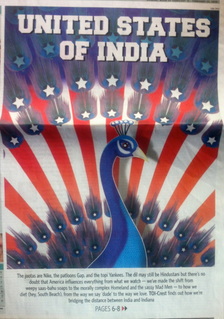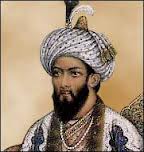 It now appears that most peoples and nations were not born into perfection but had to spend several thousands of years getting there. This unlike the French nation of course, which was sent down by God, accompanied by the Academie Francaise, speaking a perfect language, cooking perfect food and drinking perfect wine. The rest of us, it once again appears, had to work our way up to our current levels of near perfection, and, what's more, appear to have been influenced by other peoples, themselves equally imperfect. This insight was brought to me by a spate of articles in Indian newspapers on cross cultural influences. The English for example, only drank large quantities of beer until Queen Catherine of Portugal, the wife of Charles II, introduced the English Court to the art of drinking Chinese tea. The East India Company then went about monopolising the trade in tea from China to England and when that monopoly ended, began planting tea in India. Tea caught on in the Americas and the English attempt to tax tea consumption eventually led to the Boston Tea Party. Read the full and very interesting story of Catherine and her ties to Bombay and New York in the Times of India's Crest Edition.  Babur, the first Mogul invader of India, came down from Samarkand, in what is now Uzbekistan. In spite of spending a large portion of his life trying to conquer parts of North India and establishing a Mughal dynasty that was to rule India for another three hundred years, Babur did not like India and its people. "Hindustan is a country of few charms. Its people have no good looks; of social intercourse, paying and receiving visits there is none; of genius and capacity none; of manners none; in handicraft and work, there is no form or symmetry, method or quality. There are no good horses, no good dogs, no grapes, musk melons or first-rate fruits, no ice or cold water, nor bread or cooked food in bazaars; no hamams, no colleges, no torches or candlesticks," he wrote in the Tuzuk-i-Baburi." Babur's myopic view of India and his ignorance of a few thousand years of development that preceded his invasions notwithstanding, his observations highlight that a lot of what we today consider Indian, in terms of language and cuisine, is infused with Turkic, Persian and Central Asian influences.  It's funny in a way that two hundred years of English rule in India didn't succeed in altering the consumption habits of Indians much. The English may have gotten us to cultivate poppy instead of wheat, to send men to fight their wars across the globe, to speak their language and to sit for their civil service exams, but food habits essentially remained unchanged. The gravy train of rassam and dal continued unabated, disregarding the few gymkhanas around the country with their menus of English breakfasts etc. Twenty years of exposure to American culture however, post liberalisation, post the Government saying that it was ok to watch colour TV, ok to drive cars other than the Ambassador, ok to have a phone connection, ok to travel overseas with more than $100 at a time, and we can't imagine life without elements of American food. True, it's been Indianized, 'paneerized' but corporate lunches now involve cardboard Dominoes Pizza in cardboard boxes, Diet Cokes and Indian men standing around the table saying "Hey Bro, Dude! Pass me the cheese sticks!" New York's Mayor Bloomberg may ban 7 oz. slurpees in his city, but I think I know where they'll be selling next.
0 Comments
Leave a Reply. |
Categories
All
Archives
October 2022
Btw, the banner photo was taken from our holiday home outside of San Gimignano at 6.20 am. What light! It lasted all of five minutes.
|
 RSS Feed
RSS Feed
